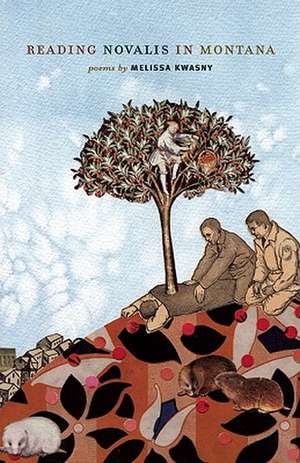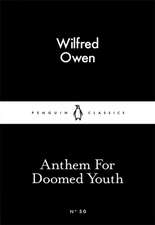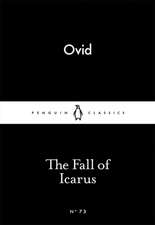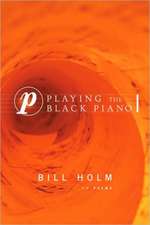Reading Novalis in Montana
Autor Melissa Kwasnyen Limba Engleză Paperback – 31 dec 2008
Preț: 82.08 lei
Nou
Puncte Express: 123
Preț estimativ în valută:
15.71€ • 16.31$ • 13.10£
15.71€ • 16.31$ • 13.10£
Carte disponibilă
Livrare economică 04-18 martie
Preluare comenzi: 021 569.72.76
Specificații
ISBN-13: 9781571314291
ISBN-10: 1571314296
Pagini: 77
Dimensiuni: 150 x 221 x 10 mm
Greutate: 0.14 kg
Editura: Milkweed Editions
ISBN-10: 1571314296
Pagini: 77
Dimensiuni: 150 x 221 x 10 mm
Greutate: 0.14 kg
Editura: Milkweed Editions
Recenzii
"Much of the innovative poetry written in America is published not by the big houses, but by independent presses like Milkweed, and its many smaller siblings. Too often, our poetry is obscure, willfully ignorant of realities beyond the immediate self, and pathetic in its complaint, narcissism, and soullessness. Moreover, the language tends to be prosaic, when it's not self-consciously experimental. Kwasny falls into none of these traps; she writes romantic-environmental poetry of a high order, communing with nature in a language that never sells itself short. Can we imagine ourselves, gluttonous twenty-first century Americans, in a better relationship with nature? Can we see ourselves beyond artificial separations between the animate and the inanimate, between the sensate and the inert? Kwasny shows how, as she refuses to back down under the pressure of material degradation."
–Huffington Post, 10 Best Books of 2009
“The title poem in this collection quotes the German Romantic poet Novalis: ‘The true philosophical act is the slaying of one's self’ — an apt motto for ecopoetry.To infuse nature with feelings, to question the separation of man and nature, defines romanticism. Twentieth-century ecopoetry by Robinson Jeffers, Gary Snyder and Wendell Berry has gone further in breaking such artificial barriers. Melissa Kwasny is a worthy successor to these spirits.”
–The St. Petersburg Times
“The work and studies of late 18th century German poet and philosopher Georg Philipp Freidrich von Hardenburg, or Novalis, set a complex backdrop for Melissa Kwasny’s latest book. However, Kwasny’s poems never slip into the pedantic as one might expect. The poems remain plastic and, at times, Spartan, and while the landscape itself often feels cold and phlegmatic (‘The dirt road is frozen.’), the speaker in the poems is never so: ‘I hear the geese first in my lungs.’ . . . Does the urge to die stem from despair, from the overwhelming urge to know, or from the urge to fuse oneself with the universal mind? Could it be any combination of these? Is such a notion quantifiable at all? Of course, Kwasny comes to no perfect solutions or explanations, but she offers some key questions, arriving most convincingly at a blend of man (as animal), mind and nature: ‘When I broke with the earth, in grief, the animals still gathered.’ Comforting. Sagacious.”
–Melinda Wilson, Coldfrontmag.com
“There are very few people who claim to have the world figured out. Trying to do so is the lost art Kwasny internally struggles with in her poetry. In ‘Is It Oblivion or Absorption When Things Pass from Our Minds?’ Kwasny talks about "the throwaway life" many humans beings lead. . . . Trying to find answers to questions of our purpose in the world is exhausting. Most just give up and lead the lives they think they have been given. Thankfully Reading Novalis in Montana never stops asking questions or trying to find answers, reminding the reader there is more to life than one settles for or often cares to know.” –Jill Hindenach, Feminist Review
"In Melissa Kwasny’s Reading Novalis in Montana, you will find that distilled title opened wide—the marriage of science and poetry in the uncompromising landscape of Big Sky Country. Like the geese populating this collection—evanescent letters forming in the air above us and moving on—Kwasny’s poems strike that tension between the concrete and the ethereal. Here is a voice brave enough to admit loving “flowers/more than people” and giving readers every reason to understand and celebrate that conviction. Read this book and know what it means to live with the world, rather than on it. "
—Eric Gansworth, author of A Half-Life of Cardio-Pulmonary Function
"Surrounded by new books of poems that seem increasingly thin and merely clever, Melissa Kwasny’s work serves as a brilliant tonic, reminding us of the essential gravitas of poems of distinction. Hers present a richly textured surface and a deeply thought interior, and have a compass that deftly mingles the scholarly page with beauticians’ hopes and tobacco pouches; a naturalist’s tight focus with the wide gaze of a woman of the world; a lyricist’s gifts with a philosopher’s understandings. This is the real-deal stuff."
—Albert Goldbarth, author of The Kitchen Sink
“Because of Melissa Kwasny’s vision as a poet—her precision of observation, her whimsy and compassion—one might compare her writing to that of early naturalist Gilbert White, the founding father of ecology. But what can the design of a naturalist’s daybook be in the twenty-first century when half of the species of the world have been or are in a process of being extinguished? Melissa Kwasny creates a dialectic between self-effacement and articulation, and through Reading Novalis in Montana one experiences what an eighteenth century reader observed about the Journals of Gilbert White, that to read them is to find one’s whole world mended. I think it is the way the writer steadies the mind.”
—Sandra Alcosser, author of Except by Nature
“Like H.D., whom she paraphrases and in her artistry resembles, Kwasny knows ‘that image is not enough.’ Equally intuitive and erudite on the survival of mule deer in winter, Artaud's tormented mind, the Cree story of Wa-sak-a-chak, or what to do with the chokecherry pulp after jelly-making, her prismatic attention never simply reconciles to the patina of past reference, nor to the temptation to become too ‘enamored of the surface.’ Always querying the otherness inherent in existence, her poetry is meticulous in its moral attention, which is without sermon or admonishment. How to attend to the sum of each instance's experience without falling back upon evaluative methods we've learned by rote? Kwasny's methods of inclusivity and measurement are as open to empiricism as they are to invocation—of animal spirit, of myth, of the great poet philosophers, of the land itself, where ‘the dirt road is frozen. I hear the geese, first in my lungs.’"
—Rusty Morrison, author of the true keeps calm biding its story
Best Book of 2009, "Much of the innovative poetry written in America is published not by the big houses, but by independent presses like Milkweed. [Kwasny] writes romantic-environmental poetry of a high order, communing with nature in a language that never sells itself short."
–Huffington Post
Best Book Cover and Best Final Poem in a Collection
–Coldfront(2009 Year in Review)
–Huffington Post, 10 Best Books of 2009
“The title poem in this collection quotes the German Romantic poet Novalis: ‘The true philosophical act is the slaying of one's self’ — an apt motto for ecopoetry.To infuse nature with feelings, to question the separation of man and nature, defines romanticism. Twentieth-century ecopoetry by Robinson Jeffers, Gary Snyder and Wendell Berry has gone further in breaking such artificial barriers. Melissa Kwasny is a worthy successor to these spirits.”
–The St. Petersburg Times
“The work and studies of late 18th century German poet and philosopher Georg Philipp Freidrich von Hardenburg, or Novalis, set a complex backdrop for Melissa Kwasny’s latest book. However, Kwasny’s poems never slip into the pedantic as one might expect. The poems remain plastic and, at times, Spartan, and while the landscape itself often feels cold and phlegmatic (‘The dirt road is frozen.’), the speaker in the poems is never so: ‘I hear the geese first in my lungs.’ . . . Does the urge to die stem from despair, from the overwhelming urge to know, or from the urge to fuse oneself with the universal mind? Could it be any combination of these? Is such a notion quantifiable at all? Of course, Kwasny comes to no perfect solutions or explanations, but she offers some key questions, arriving most convincingly at a blend of man (as animal), mind and nature: ‘When I broke with the earth, in grief, the animals still gathered.’ Comforting. Sagacious.”
–Melinda Wilson, Coldfrontmag.com
“There are very few people who claim to have the world figured out. Trying to do so is the lost art Kwasny internally struggles with in her poetry. In ‘Is It Oblivion or Absorption When Things Pass from Our Minds?’ Kwasny talks about "the throwaway life" many humans beings lead. . . . Trying to find answers to questions of our purpose in the world is exhausting. Most just give up and lead the lives they think they have been given. Thankfully Reading Novalis in Montana never stops asking questions or trying to find answers, reminding the reader there is more to life than one settles for or often cares to know.” –Jill Hindenach, Feminist Review
"In Melissa Kwasny’s Reading Novalis in Montana, you will find that distilled title opened wide—the marriage of science and poetry in the uncompromising landscape of Big Sky Country. Like the geese populating this collection—evanescent letters forming in the air above us and moving on—Kwasny’s poems strike that tension between the concrete and the ethereal. Here is a voice brave enough to admit loving “flowers/more than people” and giving readers every reason to understand and celebrate that conviction. Read this book and know what it means to live with the world, rather than on it. "
—Eric Gansworth, author of A Half-Life of Cardio-Pulmonary Function
"Surrounded by new books of poems that seem increasingly thin and merely clever, Melissa Kwasny’s work serves as a brilliant tonic, reminding us of the essential gravitas of poems of distinction. Hers present a richly textured surface and a deeply thought interior, and have a compass that deftly mingles the scholarly page with beauticians’ hopes and tobacco pouches; a naturalist’s tight focus with the wide gaze of a woman of the world; a lyricist’s gifts with a philosopher’s understandings. This is the real-deal stuff."
—Albert Goldbarth, author of The Kitchen Sink
“Because of Melissa Kwasny’s vision as a poet—her precision of observation, her whimsy and compassion—one might compare her writing to that of early naturalist Gilbert White, the founding father of ecology. But what can the design of a naturalist’s daybook be in the twenty-first century when half of the species of the world have been or are in a process of being extinguished? Melissa Kwasny creates a dialectic between self-effacement and articulation, and through Reading Novalis in Montana one experiences what an eighteenth century reader observed about the Journals of Gilbert White, that to read them is to find one’s whole world mended. I think it is the way the writer steadies the mind.”
—Sandra Alcosser, author of Except by Nature
“Like H.D., whom she paraphrases and in her artistry resembles, Kwasny knows ‘that image is not enough.’ Equally intuitive and erudite on the survival of mule deer in winter, Artaud's tormented mind, the Cree story of Wa-sak-a-chak, or what to do with the chokecherry pulp after jelly-making, her prismatic attention never simply reconciles to the patina of past reference, nor to the temptation to become too ‘enamored of the surface.’ Always querying the otherness inherent in existence, her poetry is meticulous in its moral attention, which is without sermon or admonishment. How to attend to the sum of each instance's experience without falling back upon evaluative methods we've learned by rote? Kwasny's methods of inclusivity and measurement are as open to empiricism as they are to invocation—of animal spirit, of myth, of the great poet philosophers, of the land itself, where ‘the dirt road is frozen. I hear the geese, first in my lungs.’"
—Rusty Morrison, author of the true keeps calm biding its story
Best Book of 2009, "Much of the innovative poetry written in America is published not by the big houses, but by independent presses like Milkweed. [Kwasny] writes romantic-environmental poetry of a high order, communing with nature in a language that never sells itself short."
–Huffington Post
Best Book Cover and Best Final Poem in a Collection
–Coldfront(2009 Year in Review)
Descriere
Drawing inspiration from Novalis (1772-1801) a poet who, like the other adherents of early German Romanticism, believed in the correspondence between inner and outer worlds, Kwasny divines the palpable and ineffable ways in which inherited traditions—indigenous culture, mythology, romanticism, modernism, surrealism, postmodernism, and more—inform daily life.
Finding inspiration in the mountain West, Kwasny weaves a shimmering web of connections. Reading Novalis in Montana stretches boundaries with a section of “reading poems”—poems in dialogue with romantic and modernist poets, including Ezra Pound, H.D., Novalis, Dickinson, as well as a sequence that is a twenty-first century take on “The Wasteland,” included with stunning lyric poems.
Using luxuriant syntax to string together conditional clauses, these poems throw the reader backward and forward within a line and a poem. Alternatively, repetition offers a commentary on meaning, chopping perception into fragments. Combined with a charming self-qualification that deliberately interrupts momentum, this work smartly ties the reader back down to earth.
Throughout details of lived experience emerge—hiking through the Pacific Northwest, helping a friend deal with cancer, sorting through the ruins of a relationship —and yet the interior voice is always tuned to the physical world, envisioning the shared understanding that connects all life.
Finding inspiration in the mountain West, Kwasny weaves a shimmering web of connections. Reading Novalis in Montana stretches boundaries with a section of “reading poems”—poems in dialogue with romantic and modernist poets, including Ezra Pound, H.D., Novalis, Dickinson, as well as a sequence that is a twenty-first century take on “The Wasteland,” included with stunning lyric poems.
Using luxuriant syntax to string together conditional clauses, these poems throw the reader backward and forward within a line and a poem. Alternatively, repetition offers a commentary on meaning, chopping perception into fragments. Combined with a charming self-qualification that deliberately interrupts momentum, this work smartly ties the reader back down to earth.
Throughout details of lived experience emerge—hiking through the Pacific Northwest, helping a friend deal with cancer, sorting through the ruins of a relationship —and yet the interior voice is always tuned to the physical world, envisioning the shared understanding that connects all life.














